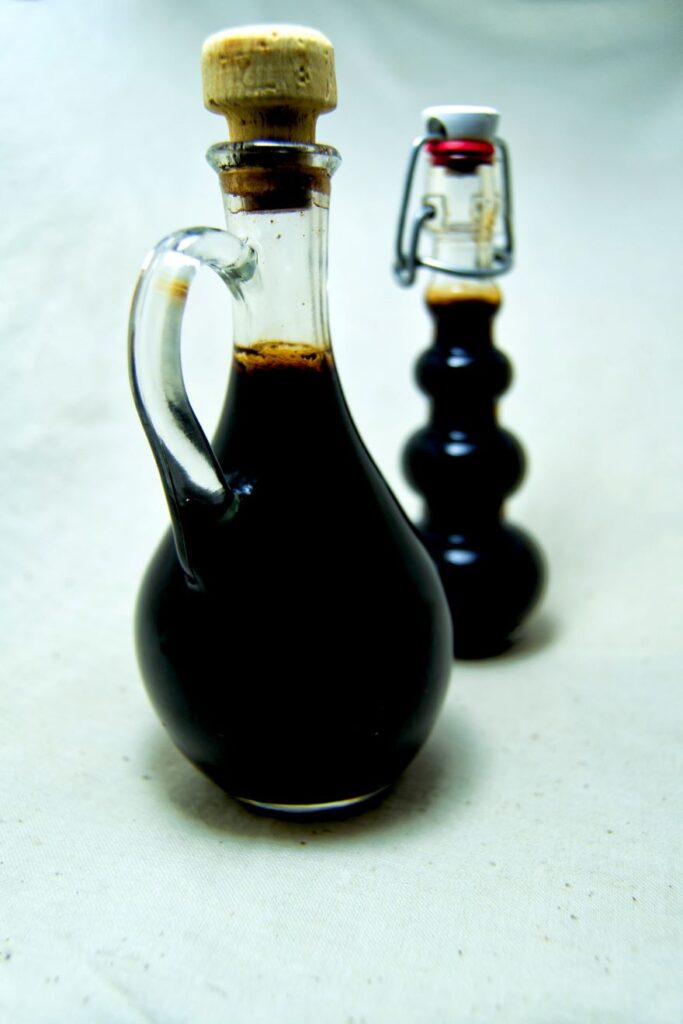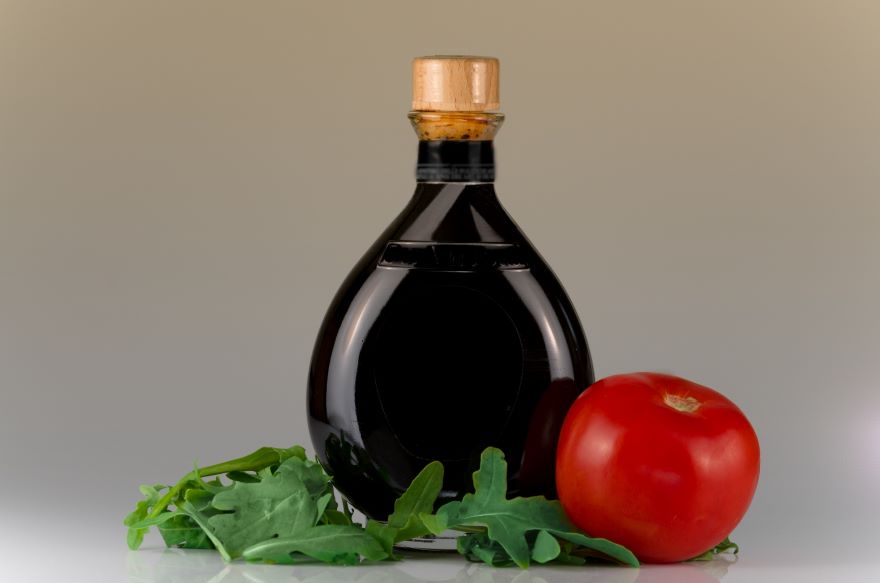Balsamic vinegar is a popular condiment with a rich history and deep roots in Italian cooking. Known for its unique and complex flavor profile, it has become a staple in many kitchens around the world. As people become increasingly health-conscious, many are turning to gluten-free diets due to allergies, intolerances, or simply a personal choice. This raises the question: is balsamic vinegar gluten-free?

In most cases, traditional balsamic vinegar is gluten-free. Made primarily from grapes, the fermentation process of producing this vinegar doesn’t typically involve any gluten-containing ingredients. However, it’s important to be aware of the differences in production and potential risk of cross-contamination, particularly with imitation balsamic vinegars, which may contain gluten due to the manufacturing process.
Key Takeaways
Traditional balsamic vinegar is typically gluten-free and safe for consumption on a gluten-free diet.
Be cautious with imitation balsamic vinegars, as they can sometimes contain gluten.
Incorporating balsamic vinegar into a gluten-free diet can offer a delicious and versatile flavor option.
Understanding Balsamic Vinegar
Tradition and Origins
Balsamic vinegar is a unique and flavorful condiment hailing from the Modena region of Italy. Its rich history dates back to more than a thousand years ago, and over time, it has become an integral part of Italian cuisine. The traditional balsamic vinegar, or Aceto Balsamico Tradizionale, is produced only in the Modena and Reggio Emilia regions of Italy.
Process of Making Balsamic Vinegar
The process of creating authentic balsamic vinegar requires careful attention, patience, and precision. To begin with, the key ingredient, grape must, is obtained by crushing and pressing various types of grapes. The grape must then undergoes a slow fermentation process, which helps develop its unique flavor.
The fermentation of balsamic vinegar is a two-step process. First, the grape must undergoes alcoholic fermentation, where the sugars are converted into alcohol. Next, the alcohol is oxidized through acetic acid bacteria, turning it into acetic acid to form vinegar.
As the newly-formed vinegar ages, it is transferred to different barrels made from diverse wood types, such as oak, chestnut, or cherry. Each wooden barrel imparts its distinct flavor characteristics to the vinegar, contributing to a complex and intricate taste profile.
Throughout the ageing process, which can span from a minimum of 12 years to more than 25 years, we must monitor the balsamic vinegar’s development closely. This ensures that it maintains its signature flavor and meets the high standards of traditional balsamic vinegar from Italy. In fact, the longer it ages, the thicker and more concentrated the balsamic vinegar becomes, resulting in a truly exceptional culinary masterpiece.
In conclusion, despite originating from a simple ingredient like grape must, balsamic vinegar evolves into an incredibly complex and exquisite condiment through the combination of traditional methods, patience, and craftsmanship that distinguishes it from other vinegar varieties.
Is Balsamic Vinegar Gluten Free
The Gluten Substance
When it comes to balsamic vinegar, we should first understand its main ingredients. Balsamic vinegar is primarily made from grapes, and since grapes are naturally gluten-free, you might assume that balsamic vinegar is safe to consume for those following a gluten-free diet. Gluten is typically found in grains such as wheat, barley, and rye, which are not present in traditional balsamic vinegar.
Additives and Manufacturing Practices
However, not all balsamic vinegars are created equal. Some commercial-grade balsamic vinegars found at grocery stores are made from a mixture of wine vinegar, sugar, water, preservatives, caramel, and flavorings, which could potentially introduce gluten-based elements to the product. That’s why it’s important to pay attention to the product label and manufacturing practices.
Most distilled vinegars, such as apple cider vinegar, white vinegar, and wine vinegar, are gluten-free even when made from gluten-containing grains, as the distillation process eliminates gluten proteins. On the other hand, non-distilled vinegars made from gluten grains, like malt vinegar, are not gluten-free.
In summary, traditional balsamic vinegar made from grapes should be gluten-free, but we can’t make the same assumption for all balsamic vinegars. For those with Celiac disease or a gluten sensitivity, it’s essential to read the product label and look for a gluten-free certification when purchasing balsamic vinegar. I have personal experience with this as my son has Celiac disease so I automatically read the labels, and even now as the ingredients can change over time.
Benefits of a Gluten-Free Diet
In recent years, many people have become more aware of gluten and its potential effects on our health. This has led to a rise in the popularity of gluten-free diets, especially for those with celiac disease. So, what are some benefits of a gluten-free diet? Let’s explore them together.
For starters, a gluten-free diet is essential for individuals with celiac disease. This autoimmune disorder affects the lining of the small intestine and poses trouble digesting gluten, a protein found in wheat, barley, and rye. By eliminating gluten from our diets, we can reduce inflammation in our intestines and avoid long-term complications such as malnutrition, neurological problems, and even certain cancers.
Additionally, cutting gluten from our diets can bring some relief to those with non-celiac gluten sensitivity. These individuals may experience symptoms similar to those of celiac disease when they consume gluten but test negative for celiac. A gluten-free diet, in this case, can help alleviate gastrointestinal discomfort, fatigue, and headaches.
On top of that, some of us might find that a gluten-free diet helps with improved digestion, increased energy levels, and better weight management. Often, these benefits emerge when we make healthier food choices – replacing gluten-containing processed foods with nutrient-dense whole foods.
However, it’s important to note that not everyone will experience the same benefits from a gluten-free diet. Each individual’s needs and preferences may vary, which is why it’s essential to consult with a healthcare professional before making any significant dietary changes.
To sum it up, a gluten-free diet can provide numerous health benefits, particularly for those with celiac disease or gluten sensitivity. No matter the reason for going gluten-free, always remember to prioritize nutrient-rich, whole foods to maximize the advantages of this lifestyle change.
Incorporating Balsamic Vinegar Into Your Diet
Tasty Recipes and Pairings
We love using balsamic vinegar as a versatile and flavorful ingredient in our recipes. It’s a great addition to salads, especially when whisked into a balsamic vinaigrette. Mixing balsamic vinegar with olive oil, Dijon mustard, and seasonings creates a tangy dressing that enhances leafy greens.
Not just for salads, balsamic vinegar can also beautifully complement strawberries. Drizzle some over fresh, ripe strawberries for a sweet and sour treat. It even pairs well with ice cream! High-quality balsamic vinegar adds flavor depth to vanilla ice cream with a few drops.
Health Benefits of Balsamic Vinegar
Apart from its amazing flavor, balsamic vinegar also brings several health benefits to the table. First and foremost, it is naturally gluten-free, making it a safe condiment for people who need to avoid gluten. Be sure to read the labels, though, as some flavored or modified varieties might contain gluten through added ingredients.
Moreover, balsamic vinegar is a low-calorie condiment, perfect for flavoring food without adding too many extra calories. Some studies suggest balsamic vinegar has anti-inflammatory, antioxidant properties and may help regulate blood sugar levels.
In conclusion, incorporating balsamic vinegar into your diet not only elevates the flavor of your meals but also provides some health benefits. So go ahead, enjoy balsamic vinegar’s delightful taste and benefits by drizzling it on salads, pairing it with fruit or ice cream.
Conclusion
In our research, we found that balsamic vinegar is indeed gluten-free. Those on a gluten-free diet can enjoy balsamic vinegar’s rich flavor without worrying about gluten content. This delicious condiment is made from grapes and aged in barrels, which is a process similar to making wine.
Balsamic vinegar offers numerous benefits for our health. One advantage is that balsamic vinegar is gluten-free, making it safe for those with celiac disease or gluten sensitivity. However, it’s important to look for authentic balsamic vinegar from the Modena Region of Italy, as some imitations may contain artificially flavored vinegar that could potentially have gluten.
In conclusion, balsamic vinegar is a versatile and tasty condiment suitable for a gluten-free diet. It’s a fantastic addition to various dishes, adding a unique and flavorful touch. So, next time you’re in the mood for something tangy, feel free to reach for the balsamic vinegar, knowing it’s safe and gluten-free for you to enjoy!
Frequently Asked Questions
- Are there any gluten-free brands of balsamic vinegar? Yes, there are gluten-free brands of balsamic vinegar. Traditional balsamic vinegar from Modena, Italy is gluten-free, made solely from boiled grape juice aged in wooden casks. However, always verify with the manufacturer and read labels if unsure about a specific vinegar brand or product.
- Can balsamic vinaigrette be consumed on a gluten-free diet? Balsamic vinaigrette can be consumed on a gluten-free diet if it is made with gluten-free ingredients. Traditional balsamic vinegar is naturally gluten-free. However, some vinaigrettes may have additional ingredients or additives that could contain gluten. It is essential to read the ingredient label and verify with the manufacturer if necessary.
- Which vinegars can gluten-intolerant individuals safely consume? Most vinegars, including apple cider vinegar, distilled vinegar, white vinegar, balsamic vinegar, and wine vinegar, are gluten-free source. However, it’s crucial to verify vinegar labels and manufacturers, as some may have additives or gluten cross-contamination.
- Is grape must found in balsamic vinegar gluten-free? Grape must, which is an integral part of traditional balsamic vinegar, is gluten-free. Grape must consists entirely of grape juice, making it safe for those who need to follow a gluten-free diet.
- Do all balsamic vinegars contain gluten? Not all balsamic vinegars contain gluten. Traditional balsamic vinegar made in the Modena Region of Italy is naturally gluten-free source. However, imitation balsamic vinegar or vinegar made using different methods may be at risk for gluten contamination. Always read labels and verify with the manufacturer if necessary to ensure the product is gluten-free.
- Are certain types of rice vinegar safe for celiacs? In general, rice vinegar is considered safe for celiacs because it is made from rice, which does not contain gluten. However, it’s important to verify rice vinegar labels and manufacturers, as some may have additives or gluten cross-contamination.

*We may earn a commission for purchases made using our links. Please see our disclosure to learn more.



